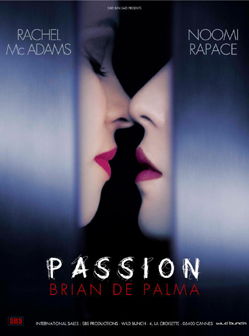FILM HAS THREE ACTS, EACH WITH ITS OWN DOMINANT COLOR SCHEME
 Dean Treadwell reported for Movie Geeks United Wednesday from the New York Film Festival, where he attended Tuesday morning's press and industry screening of Brian De Palma's Passion. Here is a transcript of Dean's review from Wednesday's episode:
Dean Treadwell reported for Movie Geeks United Wednesday from the New York Film Festival, where he attended Tuesday morning's press and industry screening of Brian De Palma's Passion. Here is a transcript of Dean's review from Wednesday's episode:Dean: Passion opened up with a beautiful score, and I was really hoping that it was who I was thinking it was, and then I was right. It opens up with the Pino Donaggio score. When his name pops up on screen, you know, I felt like we were in good hands from there on. Passion is everything you want in a De Palma movie. It is wry, it is well-crafted, it has all of those things that we love in De Palma movies. It has a masterful split-screen segment, it has playful uses of lenses and color. The film is actually, color-wise, it’s actually split—it has dominant colors in each three of its acts. The first act is, suitably for a movie called Passion, is dotted with lots of reds and purples. And basically, the film tells the story of a [vet] of female executives at a German advertising company named Koch. And they are advertising a new smart phone. And Noomi Rapace plays a producer who has come up with a great idea for a commercial where they use the smart phone as an ass-cam. And they put it online, and it creates a tremendous stir where, humorously, I thought, it gets something like five million hits in the space of five hours, or something like that. And I thought that was funny, you know, and so did the audience. Everybody was having a terrific time with it. Anyway, Rachel McAdams plays her boss, a higher up who actually steals the credit for the idea. She basically says, "You have the talent, but I made the best use of it." And she does this because she wants to move up in the company and go back to New York, and leave Germany. And this opens up a whole can of worms, which includes Noomi Rapace sort of spiralling downwards into sort of an addiction to sleeping pills. There’s the wonderful revelation that (and I’m not giving anything away here, because I don’t want to give anything away about the machinations of the plot) but there is a wonderful revelation about a twin sister—there’s a twin sister somewhere in here, which us De Palma fans love the idea of the twin sisters, because, you know… so there’s a little bit of Sisters, there’s a little bit of Body Double, because there’s a lot of kink involved in the film, a lot of kinky sex. Unfortunately, no nudity. Also, there’s a little bit of Dressed To Kill involved. When the film moves over to its second act, it becomes… all the passion is drained away, and it becomes sort of a… the visuals become sort of dabbled in this sort of icy blue feel. And this is Noomi Rapace’s sort of bottoming-out period. And then the final act of the film is basically painted in blacks and browns. It’s really wonderful. It’s a remake of a film that was done about three years ago called Crime d’amour, which starred Kristin Scott Thomas, and apparently wasn’t nearly as interesting, from what I hear from the people who’ve seen it. It wasn’t nearly as interesting, mainly because there’s another character that’s involved here, that is Noomi Rapace’s assistant. And in the original film, the assistant was cast as a gay man, but in this film it’s cast as a woman that sort of has a crush on Noomi Rapace. And so that creates a whole other layer of intrigue in the film.
Jamey Duvall: A couple of questions. I mean, gosh, I’m so excited, we have another De Palma thriller. And I think it’s the first one since Raising Cain, isn’t it? Or Femme Fatale. So it’s been ten years or so since he’s worked in this genre. So when you see it begin, and it’s clearly De Palma-esque, as we all know and love, and you see Pino’s name and that romantic, lush score, I can imagine it is, does it feel like you’re in a time vault, in a way? As a De Palma fan?
Dean: Absolutely. Absolutely. It is an absolute eighties, I would say a mid-eighties throwback. It absolutely feels like you’re watching this on Cinemax late at night. It’s got slinky saxophone on the score, you know, and everything is sort of steely and glassy in it, you know. And there’s times where you’re confused about space and about time. And that’s also, you know, a De Palma sort of mainstay for his thrillers. It’s really… I don’t want to oversell it, because, you know, I have to confess I like Femme Fatale a little bit more. Or some of his classics. But I would definitely put it up there with something like Dressed To Kill. I mean, it was fun.



